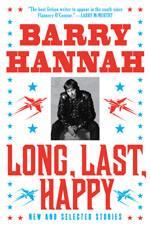Barry Hannah: Long, Last, Happy
Long, Last, Happy is a 450-page compilation of Barry Hannah’s greatest hits from four previously-published short story collections, as well as four new, uncollected stories. These stories are pieces of what was to be a novel, but will now have to remain in fragments. Hannah was always a better short story writer than a novelist, so perhaps it is best that these stories stand as they are. For those who appreciate Hannah’s pyrotechnic brilliance, his work in all forms will be greatly missed.
Not everyone can be expected to appreciate Hannah. Especially resistant are those who gravitate naturally to substance over style, who are aggrieved by "voice-y" narratives, or who require even a modicum of political correctness. The posthumous republishing of Hannah’s work will bring new readers. Hannah, until his death last spring, was arguably one of the voice-iest writers working, did not adhere to any accepted narrative arc, and was to many the antichrist of PC. One of the beautiful aspects of his work though, to those who love it, is that he picked on everyone, equally and unequivocally—there were no sacred cows in his world—and beneath the raw and uncouth verbiage lie glimpses of redemption and humanity well worth scratching the surface to get to. Hannah claimed to be "committed to people who could never tell their own stories," and the array of ass-out folks who people his fiction are testament to that commitment. The other part of it, and what makes his stories feel so spoken by their narrators, was Hannah’s ability to imagine, access, and translate a full range of human experience.
The opening of "Mother Mouth" (from his second collection, Bats out of Hell) illustrates the way Hannah’s work unapologetically drops his readers into the deep end, pretty much assuming they will either climb out or swim:
Today, Vernon, I noticed Elvis was getting hairy. Finding that, my tongue got hot all the way down to my heart to which it was attached. There was no keeping of the temperature or the rump rump noise of my want in my person. We don’t go to church hardly anymore except to learn good English. … We take the airwaves out of our little Philco and spit them back with the mama panther in them. The Philco is all we could afford after you wrote the extra zero on that check and left us for three years and jail.
Two pages later it ends, "…there ain’t anything like Mama Nooky. Ask all them soldiers that lay dying on the fields of that great war you weren’t in."
Every story Hannah wrote was in one way or another a love story, and he had an almost uncanny ability to inhabit personas, to essentially channel his characters—drunks, pilots, musicians, lying old geezers, heartbroken men and women, Civil War soldiers or their Vietnam counterparts. This talent is what sets his writing apart. It is obvious that he drew primarily from his own experiences in crafting his characters’ lives, at least for the important stuff (matters of the heart). By doing it so unflinchingly, he produced work that is both painful and gorgeously profound.
Hannah once wrote:
I write out of a greed for lives and language. A need to listen to the orchestra of the living. It is often said that a writer is more alive than his peers. But I believe he might also be sleepier than his peers, a sort of narcoleptic who requires constant waking up by his own imaginative work. He is closer to sleep and dream, and his memory is more haunted, thus more precise. I think of those moments in Faulkner and Beckett when the words seem absolutely final, bodiless, disattached, as out of a cloud of huge necessity. My desire to come even close to that team is vanity met with gratitude: that you were hit by something as you stood in the way of it, that anybody is listening. (Harpers, June 2010).
Stand in the way of it, if you haven’t already, and if you have, stand in the way of it some more.
 Barry Hannah
Barry Hannah